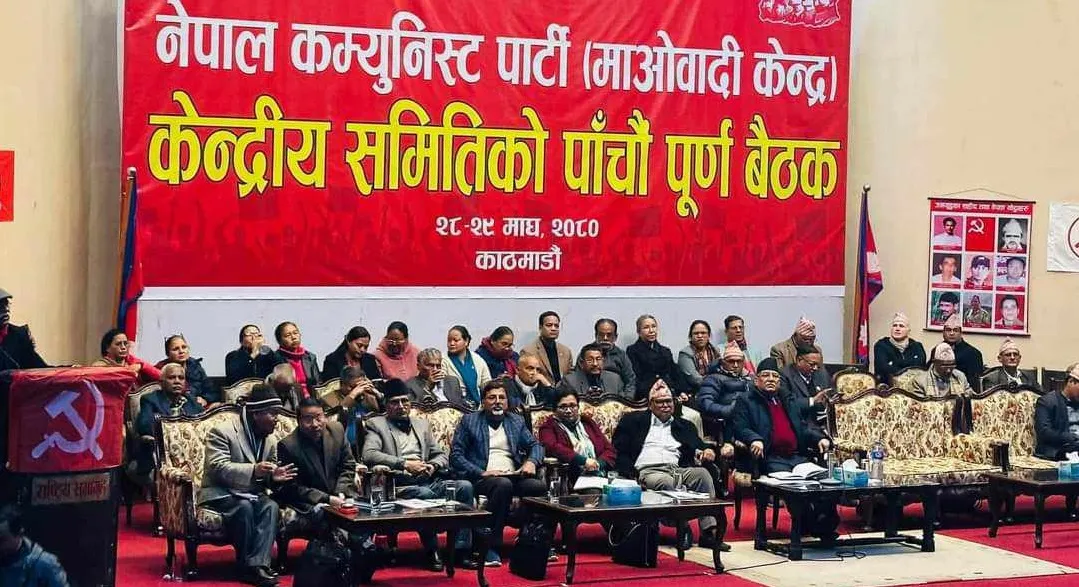KATHMANDU: Maoist leaders express discontent with the growing opulence of Maoist Cente leadership, citing a lack of understanding of the law and an inability to articulate party principles in the Kathmandu Valley due to ideological ambiguity.
The leaders’ extravagant lifestyle has been criticized, with reports of gambling becoming a concern among both leaders and cadres.
The statute convention has witnessed discussions on party formation, where Maoist leaders engaged in a special transformation campaign with the public from Bhadra 17 to Mangsir 17.
During Sunday’s central committee meeting held in Kathmandu, reports from 10 provincial committee chairpersons and in-charges highlighted the Maoist transformation campaign and its impact on provinces.
Leaders stressed the importance of maintaining honesty, being people-friendly, and cautioned against wavering in leadership.
Matrika Prasad Yadav, Karnali province in-charge, addressed issues of non-payment of levy fees, emphasizing that this problem is not limited to Terai Madhes but is widespread in Karnali as well.
He urged leaders to address gambling issues among party members in the province.
Bagmati in-charge and House of Representatives member, Janardan Sharma, emphasized the need for the party leadership to connect with urban dwellers and the middle class.
Sharma argued that the failure to penetrate the Valley during the 2079 BS election was due to the insufficient explanation of Maoist doctrine.
Leader Ram Karki suggested that the Maoist party’s strength could be reinforced by positive endorsements from families of martyrs and missing persons.
Karki called for the involvement of the new generation in politics and highlighted the increasing frustration towards the leadership in the Maoist government for not adequately respecting and rehabilitating martyrs and bereaved families.
Adding to the discussion, Bagmati Province Chairperson Saral Sahayatri expressed dissatisfaction with the party’s inability to organize an effective campaign, citing a lack of systematic management.
Another leader Girirajmani Pokharel claimed that the organization had been strengthened by the three-month campaign and emphasized the need to extend this campaign widely.
Barshman Pun, Valley Special Province Committee in-charge, advocated for the development of the Bagmati Special Province and credited the three-month campaign for revitalizing the previously inactive party.
Central member and lawmaker Madhav Sapkota urged the party to address public concerns, reinforcing that the people’s hope and trust lie in the Maoist party.
Sapkota emphasized the importance of engaging with the public to strengthen and solidify the party’s position.
Central member Ranjit Tamang emphasized the imperative of mobilizing the voice of the youth within the party, advocating for widespread representation of the younger generation.
He asserted, “The inclusion of youth in the transformation campaign holds particular significance. Safeguarding the youth is crucial, as the public places their trust in this demographic.”
Leader Sita Thebe echoed the sentiment, stating, “The discussion of mobilizing youth on a large scale has been prominently raised. Emphasizing a collaborative effort where the youth can learn from the experiences of the older generation has been prioritized.”
Adding to the discussion, Bagmati Province Chairperson Saral Sahayatri expressed dissatisfaction with the party’s inability to organize an effective campaign, citing a lack of systematic management.
A participant in the meeting, speaking to Khabarhub, revealed strong criticism directed at the leadership.
The meeting, attended by 409 central members and around 900 participants, including members from the Disciplinary Committee, Central Audit Committee, Central Election Committee, and others, is scheduled for two days, Sunday and Monday.









Comment